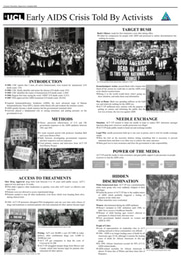What was the perceived effectiveness of U.S and UK government responses to the AIDS epidemic between 1981 and 1994 ?
HIV-AIDS is a life-threatening illness still taking lives today. Yet at its discovery, governments around the world reacted in vastly different ways -some silent while other proactive. Fellow Laidlaw Scholar Lucas Dastros-Pitei and I sought to uncover the hidden history of the early AIDS epidemic.


Please sign in
If you are a registered user on Laidlaw Scholars Network, please sign in
After reading this, I'm genuinely taken aback by how much our social beliefs and the very systems we trust can shape the response to a health crisis. It's so eye-opening to see the contrasting reactions of the U.S. and U.K. during the early stages of the AIDS epidemic. It makes you wonder how many lives could've been saved if things were handled differently. And hats off to groups like ACT-UP! Their tenacity just goes to show how everyday people can drive real change when it matters the most. The part about the media's role really got me thinking too—how what we see and hear can frame an entire narrative, for better or worse. This paper is a wake-up call, reminding us of the power of timely and empathetic actions during health crises. Kudos to you and Lucas for this research and for making us reflect on the past in hopes of a better future.